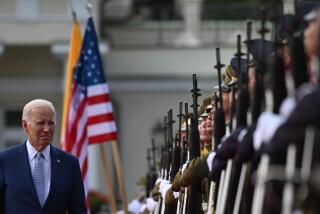Christopher Links NATO’s Future, U.S. Role in Bosnia
- Share via
WASHINGTON — Congress will effectively destroy the North Atlantic Treaty Organization if it blocks the Clinton Administration’s plans to commit U.S. troops to a NATO-led peacekeeping force in Bosnia, Secretary of State Warren Christopher said Tuesday in some of his strongest language on the subject.
“If we get a peace settlement and the United States does not participate in the enforcement, I believe it would be the end of NATO,” Christopher said during a breakfast with the Washington Bureau of The Times. “If we do not join our NATO allies in that important endeavor, it would undermine NATO, which has been the most effective military alliance in the history of the world.”
Christopher added that the Muslim-led Bosnian government has made it clear that it will not agree to a peace settlement unless it gets advance assurances that Americans will be part of the NATO supervisory force.
Some Republicans in Congress have expressed doubts about the wisdom of sending U.S. ground troops to the Balkans. They have demanded to be consulted before the Administration commits such a force and have suggested that they might push legislation to prevent it.
Christopher derided the opponents as misguided lawmakers who believe that the United States should exercise world leadership but are unwilling to spend the money or run the risks that leadership demands. Nevertheless, he predicted that Congress ultimately will approve U.S. participation in the peacekeeping force.
“I think when the President decides that something needs to be done in the national interest . . . and begins to talk to the American people about it, that becomes something the country needs to do,” he said. “When the time comes, if all of the issues get posed, if we answer them well, I think the Congress will support what the President has done here.”
Christopher conceded that Congress has the authority to stop any troop deployment in its tracks by refusing to appropriate the necessary money. At the same time, he hinted that President Clinton might try to defy congressional interference in what the White House views as its constitutional authority over the armed forces, and send the troops anyway.
Clinton pledged two years ago to contribute about half of a NATO peacekeeping force estimated at 50,000. Some U.S. and NATO officials have suggested recently that the force might be smaller.
Meanwhile, State Department spokesman Nicholas Burns delivered a rare criticism of the Croatian government, which Washington has long regarded as friendly. He said U.S. officials are concerned about reports of atrocities by Croatian troops who drove Croatian Serbs out of the country’s Krajina region.
The U.N. Security Council also demanded, in a statement unanimously approved Tuesday, that the Croatian government “investigate all reports of human rights violations and take appropriate measures to put an end to such acts.”
The council also criticized the Croatian government for withdrawing refugee status from tens of thousands of Bosnian refugees and for failing to respect the right of ethnic Serb refugees to return to their homes.
Defending government policy, Mario Nobilo, Croatia’s ambassador to the United Nations, said in a statement that no Bosnian refugees “will be repatriated against their will” and that the Serbian refugees should not be considered refugees because they left Croatia “at their own will.”
Also Tuesday, the United Nations issued a sharp condemnation of the Bosnian government after its army fired four heavy weapons from inside the U.N.-designated 12 1/2-mile exclusion zone around Sarajevo. The United Nations said the weapons were fired at Bosnian Serb positions outside the zone, a violation of U.N. agreements.
“This is an outrageous act,” said U.N. spokesman Alexander Ivanko.
Times staff writers Stanley Meisler at the United Nations and Dean E. Murphy in Erdut, Croatia, contributed to this report.
More to Read
Get the L.A. Times Politics newsletter
Deeply reported insights into legislation, politics and policy from Sacramento, Washington and beyond. In your inbox twice per week.
You may occasionally receive promotional content from the Los Angeles Times.









